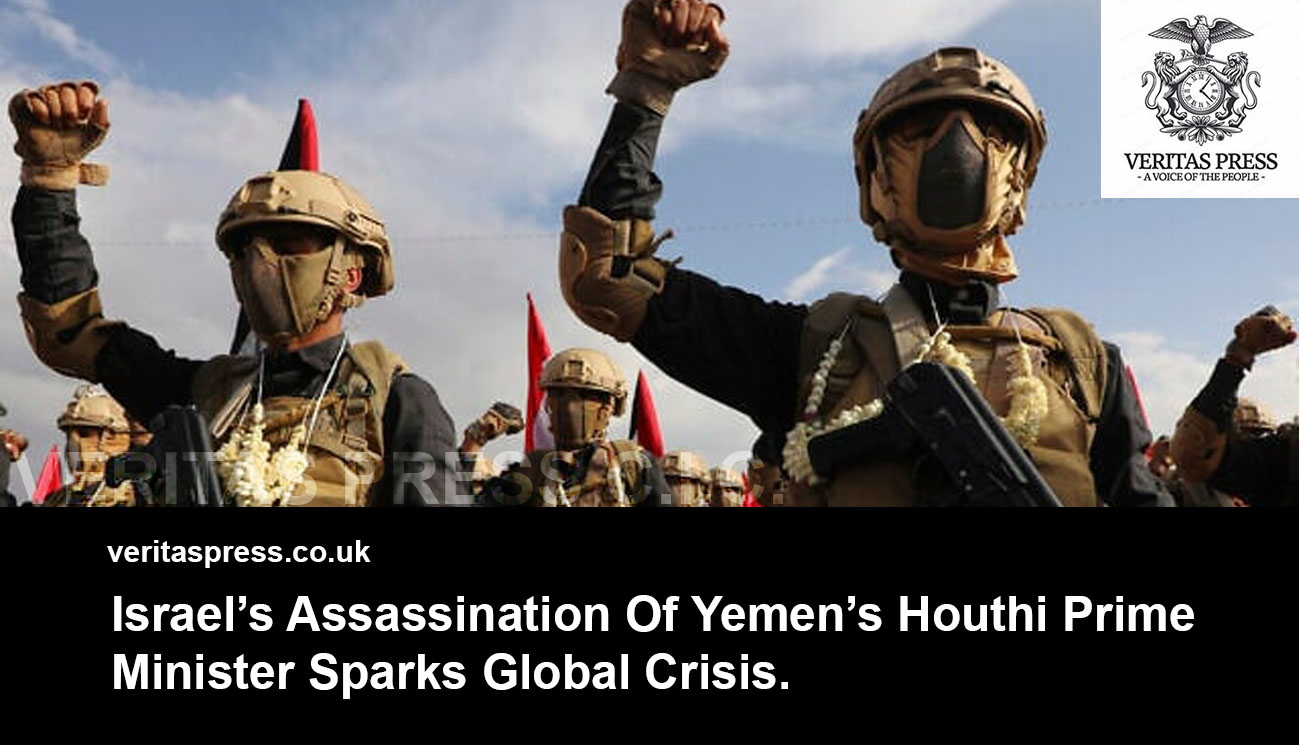Press Release: Veritas Press C.I.C. Author: Kamran Faqir Article Date Published: 31 Aug 2025 at 11:15 GMT Category: Middle East | Palestine-Gaza | US-Israel At War Source(s): Veritas Press C.I.C. | Multi News Agencies
Sanaa – A Targeted Killing With Global Consequences:
On the evening of 28 August, Sanaa’s fragile calm erupted under a sky lit by airstrikes. The target was not a weapons cache nor a military outpost; it was the nerve centre of Yemen’s Houthi political leadership. Ahmed Ghaleb al-Rahawi, the Houthis’ prime minister, along with several senior ministers, was killed in what Israel hailed as a “precision strike” deep inside the Yemeni capital.
Israeli Defence Minister Israel Katz declared the operation a success: “This is only the beginning,” he warned, framing the killing as part of a broader campaign against groups threatening Israeli and allied interests in the Red Sea.
The strike, coordinated with Western intelligence, has set off a chain reaction of maritime threats, diplomatic standoffs, and fears of regional escalation.
A Blow Beyond Yemen:
The assassination comes amid an intensifying shadow war between Israel and Yemen’s Iran-aligned Houthis. The group has repeatedly targeted ships in the Red Sea and Gulf of Aden since the Gaza war escalated, claiming solidarity with Palestinians. In their latest statement, the Houthis vowed to attack “any vessel linked to Israel, including U.S. and U.K. warships.”
“We are in full solidarity with the Palestinian people,” a Houthi spokesperson said. “Our operations will only stop when Israel ends the occupation and withdraws.”
Analysts warn the strike risks transforming a maritime harassment campaign into a full-scale naval insurgency across one of the world’s most vital shipping corridors.
Expert Analysis: “This Is Decapitation, Not Deterrence.”
Dr. Lina El-Fadel, a senior analyst at the International Crisis Group, told us this marks an alarming escalation:
“We’ve crossed into the realm of leadership decapitation. It’s the kind of move that rarely ends a conflict; it escalates it, radicalises populations, and internationalises the war.”
Professor David Calderbank of the Royal Institute of International Affairs added:
“Striking a secure meeting inside Sanaa shows Israel’s expanding operational reach, possibly with U.S. satellite support. It signals to Iran and Hezbollah as much as to the Houthis.”
But Sarah Kittridge, a UN legal advisor, warned of international law implications:
“Targeted killings on foreign soil require clear, imminent-threat justification. Without transparency, this risks undermining the rule of law and sovereignty norms.”
Red Sea Under Siege:
The Houthis’ retaliation promise is already playing out at sea. In recent days, bulk carriers Magic Seas and Eternity C were struck by anti-ship missiles, leaving crews hostage and insurers panicking. Freight rates have surged, and major shipping firms are rerouting around the Cape of Good Hope, a move adding weeks and millions to global supply chains.
A senior shipping executive told us bluntly:
“This is the most dangerous maritime environment we’ve seen since the 1970s oil crisis. If the Red Sea locks down, global trade takes a hammering.”
Humanitarian Costs Mount:
For Yemen’s 30 million people, already grappling with famine and disease, the airstrike represents another trauma. Hospitals in Sanaa report an influx of wounded after collateral blasts from nearby strikes earlier in the week.
Omar Al-Husaini, a medic in Sanaa, painted a grim picture:
“Every time the sky roars, another child comes in bleeding. We’re holding this system together with tape, and now the bombs hit our leaders.”
UN agencies warn the violence could derail fragile aid pipelines into Yemen and worsen one of the world’s worst humanitarian crises.
Diplomatic Shockwaves:
Washington and London, while privately supportive of Israel’s security posture, issued calibrated statements urging restraint.
The U.S. State Department called for “steps to prevent further escalation,” while the British Foreign Office warned of “dangerous consequences for regional stability.”
At the UN, Egypt and Oman demanded immediate cessation of targeted killings, while Russia and China pressed for an independent investigation. Gulf states fear the fallout could spiral into a regional proxy war.
A senior Gulf diplomat summed up the mood:
“If Yemen spins out of control, this isn’t a Yemen war anymore, it’s a fire across the Middle East.”
Strategic Motives & Geopolitical Consequences:
The assassination of Ahmed Ghaleb al-Rahawi is not an isolated military action; it is part of a broader strategic design intertwining regime change, regional control, and economic ambition. Analysts argue that Israel’s targeted killings of Houthi leadership are about far more than immediate security concerns: they are a tool to reshape Yemen’s political alignment and secure Western-friendly interests across the Red Sea corridor.
- Regime Change As Foreign Policy Instrument:
Targeted killings in Yemen follow a pattern observed across the Middle East: precision strikes against political and military leaders as a method of engineering political outcomes. According to Dr. Lina El-Fadel:
“The removal of top Houthi officials is intended to disrupt command structures, intimidate leadership, and reorient the conflict to align with Western strategic objectives. It’s regime change by stealth, under the pretext of counterterrorism.”
Sarah Kittridge, A UN Legal Advisor, Cautions:
“Using assassination as policy blurs the line between lawful self-defence and extrajudicial execution. It sets a dangerous precedent for international relations and sovereignty.”
This strategy directly influences U.S. and Israeli foreign policy, shaping their engagement in Yemen and the broader region, not as isolated security measures, but as a deliberate alignment with Western geopolitical objectives.
2. Red Sea Control And Maritime Strategy:
The Red Sea is one of the world’s most critical maritime corridors, funnelling nearly $1 trillion in goods annually. Since the escalation of Israel-Hamas tensions, the Houthis have declared that any ship linked to Israel, including U.S. and U.K. warships, is a legitimate target. This threatens to internationalise the conflict, disrupt global shipping, and exert leverage over trade.
3. The Ben Gurion Canal: A Strategic Vision Revived.
Beyond immediate military objectives, Israeli analysts and regional observers note a long-term strategic ambition tied to the historic Ben Gurion Canal project. Envisioned to link Eilat on the Red Sea to Ashkelon on the Mediterranean, the canal would allow Israel direct control over a transnational waterway. Targeting Houthi leadership along the Red Sea aligns with securing this corridor and advancing Israel’s economic and strategic ambitions.
4. Regional And Global Implications:
- Maritime Security: Threats to shipping raise insurance premiums, divert trade routes, and risk clashes with neutral nations’ vessels.
- Regional Proxy Conflicts: Iran-aligned Houthis retaliate in ways that threaten Gulf stability.
- Humanitarian Fallout: Civilian casualties and disrupted aid worsen Yemen’s crisis.
- Diplomatic Strain: Western allies face pressure to balance support for Israel with global norms and maritime security responsibilities.
5. Policy Recommendations For De-Escalation:
- Immediate Ceasefire & No-Strike Zones, UN-mediated talks to safeguard civilian infrastructure.
- Independent International Investigation, Clarify the legality and civilian impact of strikes.
- Secure Maritime Corridors – Multi-national monitoring and naval escorts to protect global trade.
- Direct Communication Channels – Israel, Houthis, and Western navies must establish rapid deconfliction lines.
- Conditional Diplomatic Framework – Reciprocal agreements: reduction of attacks in exchange for suspension of leadership-targeted strikes.
- Humanitarian Access & Relief – Ensure UN and NGO aid convoys reach civilians without interference.
The Perilous Logic Of Targeted Power:
The killing of Ahmed Ghaleb al-Rahawi demonstrates a dangerous shift from tactical military operations to geopolitical engineering. Israel’s assassination campaign, sanctioned by its allies, normalises extra-territorial targeted killings and regime-change tactics. Coupled with ambitions like the Ben Gurion Canal, these operations show that military precision is being leveraged to reshape political landscapes in favour of Western-aligned interests.
The Houthis’ response, escalating naval strikes, vowing solidarity with Palestinians, and threatening international shipping, illustrates that decapitation strategies rarely end conflicts; they exacerbate them. Legal scholars and security analysts warn that the combination of extrajudicial killings and strategic ambitions erodes sovereignty norms and risks regional escalation, while leaving millions of civilians exposed to a humanitarian catastrophe.
Without immediate diplomatic interventions, the Red Sea corridor may become the next theatre of open asymmetric warfare, threatening global trade, regional stability, and the survival of vulnerable populations in Yemen. The world faces a stark choice: contain the escalation through diplomacy or allow a fragile conflict to spiral into a regional conflagration with global consequences.
In Conclusion: The Strategic and Ethical Abyss
The assassination of Ahmed Ghaleb al-Rahawi is more than a tactical strike; it is a window into a highly militarised, opaque, and morally compromised approach to foreign policy. Israel’s decapitation strategy, carried out with Western intelligence support, signals a disturbing normalisation of extrajudicial targeted killings as instruments of regime change. By eliminating key Houthi leaders, the operation not only destabilises Yemen’s fragile political structures but also reshapes U.S. and Israeli regional policy in ways that serve Western-aligned interests, rather than local security or humanitarian imperatives.
This strike underscores a broader geostrategic calculus: securing Red Sea corridors, projecting power along critical maritime routes, and reviving ambitions such as the Ben Gurion Canal, all under the guise of counterterrorism. Yet history and expert analysis show that decapitation rarely achieves long-term control; instead, it radicalises communities, internationalises conflicts, and triggers cycles of violent retaliation. In Yemen, these dynamics are already unfolding as the Houthis escalate naval attacks on commercial and military vessels, threatening global trade and regional stability.
Equally alarming is the void of accountability. No UN mandate, no international tribunal, and no transparent legal framework justify strikes that cross borders and target civilian-adjacent political leadership. These actions erode the norms of sovereignty and international law, creating a dangerous precedent for extraterritorial intervention wherever strategic or economic interests collide.
The operation exposes a fundamental tension in modern warfare: technological precision and intelligence superiority can execute tactical victories, but political legitimacy, human cost, and long-term stability are left in ruins. For the millions of Yemenis already living under famine, disease, and war, the consequences are immediate and catastrophic. For the international community, the stakes are equally high: unchecked targeted killings and strategic interventions risk a cascading regional war that could engulf the Red Sea, the Gulf, and beyond.
In short, this is not merely a conflict over territory or ideology; it is a dangerous experiment in power, sovereignty, and lawlessness, with Yemen’s population, global shipping, and regional stability caught in the crossfire. The world now faces a critical question: will it demand accountability and enforce diplomacy, or allow a strategy of targeted decapitation and regime manipulation to dictate the future of the Middle East?
Tags:




























Leave a Reply